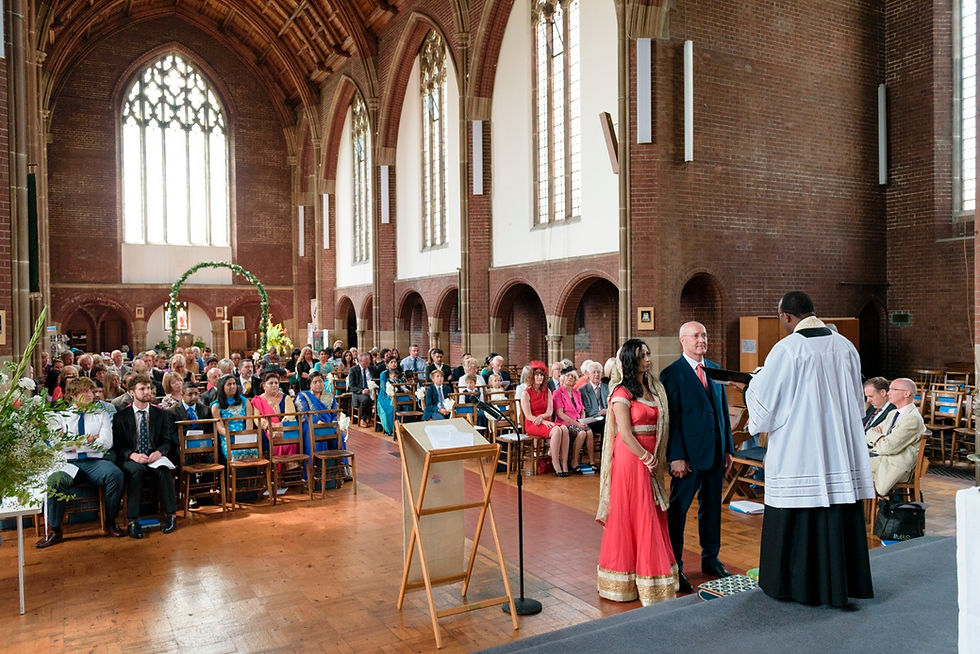When our memories may stalk us
- Ross Moughtin

- Aug 8, 2025
- 4 min read

Tomorrow marks wedding number four — completing the set!
In just 12 days, I will have conducted four weddings and a funeral. It began with the funeral, which the family later described as “inspirational.” They were delighted when I told them their service would be followed by four weddings — they would be telling all their friends!
Each of the weddings has been unique — different couples, different churches, but all joyful occasions. Celebrations of love, yes, but more than that: each was a celebration of a relationship offered to God.
And I’m glad to report, no panic attacks. Unlike one wedding I took earlier this year.
That experience — and indeed, that tendency — goes right back to a wedding I conducted as a young curate in Heswall, some 45 years ago. It was the wedding of the year: two well-known local families, full church, much millinery, lots of morning suits. Normally, the Rector would have presided, but we were in an interregnum, and the task fell to me.
The groom — as it happened, a contemporary of mine from Cambridge — was a lawyer, clear about what he wanted. He specifically requested the marriage preface from the 1928 Prayer Book. This was, after all, a different era. In those days, the 1928 version was often preferred over the 1662 text — the latter still famously stating that one of the reasons for Holy Matrimony was “to satisfy men’s carnal lusts and appetites, like brute beasts that have no understanding.” (!)
At St Peter’s there was only one copy of the 1928 Prayer Book — a lovely, chunky, large-print edition. And because it was only ever used for weddings, the page with the marriage preface was loose.
The service began with due ceremony. We sang the opening hymn with gusto — I, as usual, singing from the couple’s service sheet, resting it on the open prayer book. But as the hymn ended, I moved the service sheet aside — and PANIC. The 1928 preface page had vanished.
I assumed I’d dropped it. I looked around. Nothing.
By now the congregation had all sat down and were looking expectantly at me — the young curate — ready to hear the solemn and stately words of the 1928 preface, as requested by the groom.
But it wasn’t there. And there was no second copy in the building. What could I do?
Looking back, I can only admire my courage — but I had no alternative. I decided to speak the preface from memory. Not that I knew it all that well. One part of my brain frantically tried to reconstruct the text, while the other searched for the missing page.
Then — mercifully — it clicked. I had lifted the preface page along with the service sheet. I retrieved it discreetly and carried on. To my relief, no one noticed.
That afternoon, I had a full-blown migraine.
Ever since, reading the wedding preface has occasionally triggered a mild panic response — unwelcome, but understandable. Over the years, I’ve learned — with the help of the Holy Spirit — to face it, name it, and deal with it.
Or so I thought.
Earlier this year, to my surprise and alarm, I experienced a mild panic attack during a wedding — precisely as I began the preface. There were specific reasons: it was a last-minute invitation to take a service in an unfamiliar chapel. I didn’t know the couple, there were no hymns, the sound system was poor, the lighting worse. But most of all — the congregation looked grim. No smiles, no warmth. Just a room full of unsmiling faces.
I realised later I had picked up something deeper than mood — I think I was sensing strong spiritual resistance. It reminded me that, as clergy, we are often far more vulnerable to emotional and spiritual "vibes" than we realise. Especially when we represent Jesus.
It’s not uncommon. Many clergy — even those with decades of experience — report moments of anxiety before or during key liturgical moments. The wedding preface, in particular, can feel like a moment of exposure. It’s formal, theological, emotionally charged — and all eyes are on you.
You may remember the priest, as played by Sean Bean in Jimmy McGovern’s Broken, who suffers a panic attack during the Mass. The words catch in his throat. He’s overwhelmed. The presence of God, the burden of his past, the expectations of his people — it all collides. It’s not about doubt. It’s the terrible awe of standing at the threshold of the holy while feeling utterly human.
But as the writer to the Hebrews reminds us:
“We don’t have a priest who is out of touch with our reality. He’s been through weakness and testing, experienced it all — all but the sin. So let’s walk right up to him and get what he is so ready to give. Take the mercy, accept the help.”
(Hebrews 4:15, The Message)
The God we serve does not expect us to be invulnerable. Sometimes the Holy Spirit works not through our strength, but precisely in our weakness.
And yes — even memories from long ago, like that long-lost preface page, can still stalk us. But again, we bring them to God — to heal, to redeem, even to overwrite. And in his mercy, he does.



Comments